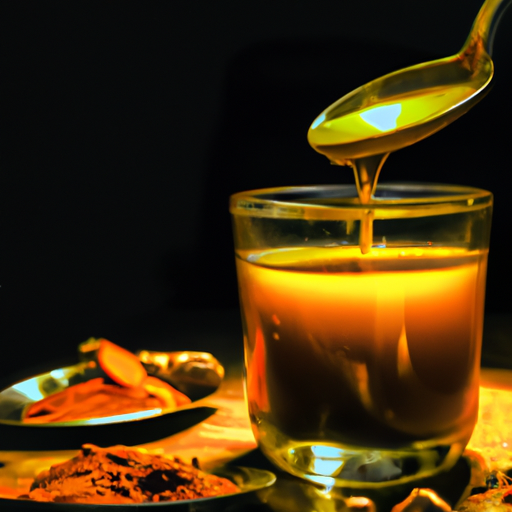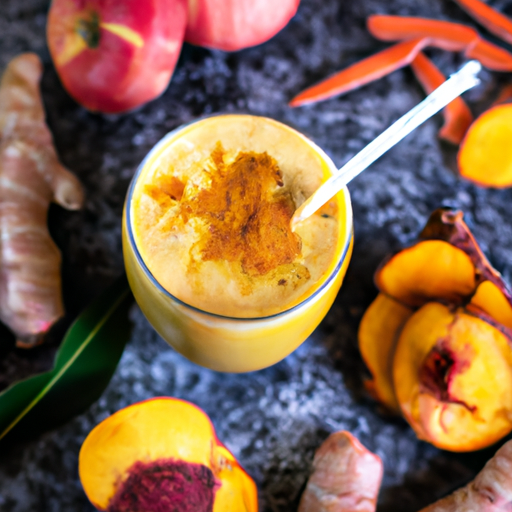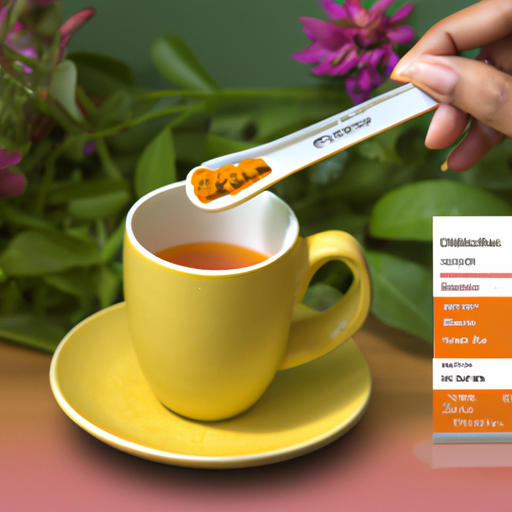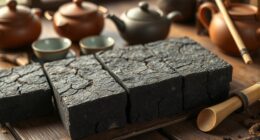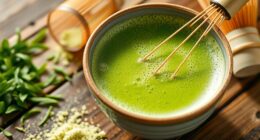You may have heard about the numerous health benefits of turmeric, a vibrant yellow spice commonly used in Indian cuisine. But did you know that you can sprinkle turmeric in your tea for an extra boost of wellness? It’s true!
This ancient spice, known for its active compound called curcumin, has been studied extensively for its potential health-promoting properties. From reducing inflammation to boosting brain function, turmeric has garnered attention from health enthusiasts around the world.
However, before you reach for that turmeric shaker, it’s important to understand the potential risks and how to incorporate it properly into your tea. In this article, we will delve into the health benefits and risks of consuming turmeric, explore the best types of tea to pair it with, and provide tips on how to maximize its benefits. We will also examine expert opinions and studies on turmeric in tea, so you can make an informed decision about whether sprinkling turmeric in your tea is safe and effective for you.
So, let’s dive in and explore the wonders of turmeric and tea!
Key Takeaways
- Turmeric contains curcumin, an active compound with potential health-promoting properties.
- Turmeric can be safely sprinkled in tea to enhance the tea experience.
- Adding turmeric to tea can provide numerous health benefits, including anti-inflammatory and antioxidant properties.
- The benefits of turmeric in tea can be optimized by consuming it with black pepper or fat, such as milk or coconut oil.
The Health Benefits of Turmeric
Adding turmeric to your tea can provide a colorful and flavorful boost while also offering numerous health benefits. Turmeric has long been used in Ayurvedic medicine for its healing properties, and recent studies have shown that it may have a wide range of health benefits.
One of the key benefits of turmeric is its potential for improving skin health. Its anti-inflammatory properties can help reduce redness and inflammation, making it a popular ingredient in skincare products.
Additionally, turmeric has been used in Ayurvedic medicine to support digestion and reduce inflammation in the body. However, it’s important to note that while turmeric is generally safe for most people, it may cause gastrointestinal issues or interact with certain medications.
In the next section, we will explore the potential risks of consuming turmeric without any additional steps.
The Potential Risks of Consuming Turmeric
Be careful, though – consuming too much turmeric can be like pouring hot sauce on your taste buds. While turmeric is generally safe for consumption in moderate amounts, excessive intake can lead to potential side effects. Here are four things to keep in mind when it comes to turmeric dosage:
-
Stick to recommended amounts: The World Health Organization suggests a maximum intake of 1.4 mg of turmeric per pound of body weight. Consult with a healthcare professional to determine the appropriate dosage for you.
-
Possible gastrointestinal issues: Consuming high doses of turmeric may cause stomach discomfort, bloating, or diarrhea in some individuals.
-
Increased risk of bleeding: Turmeric has blood-thinning properties, so excessive consumption may increase the risk of bleeding, especially for those taking blood-thinning medications.
-
Allergic reactions: Although rare, some people may be allergic to turmeric, experiencing symptoms such as skin rashes or difficulty breathing.
Now that you’re aware of the potential risks, let’s explore how to incorporate turmeric into your tea seamlessly.
How to Incorporate Turmeric into Your Tea
To seamlessly incorporate turmeric into your tea, consider infusing it with warm spices and a touch of honey for a sophisticated and flavorful twist. Turmeric latte recipes are a popular way to enjoy the benefits of this vibrant spice. Simply combine turmeric, cinnamon, ginger, and a pinch of black pepper with your choice of milk and sweetener, then heat it gently on the stove.
Another option is to make turmeric-infused iced tea by adding turmeric powder or grated turmeric root to a pitcher of cold brewed tea, along with some lemon slices and a drizzle of honey. Let it steep in the refrigerator for a few hours and enjoy a refreshing and healthy beverage.
When it comes to pairing turmeric with tea, the best types are herbal teas like chamomile or green teas like matcha. These teas complement the earthy and slightly bitter flavor of turmeric, creating a harmonious blend of tastes.
The Best Types of Tea to Pair with Turmeric
When it comes to pairing turmeric with tea, there are a few options that work particularly well. Herbal teas, such as chamomile or peppermint, can complement the earthy flavor of turmeric while providing their own unique health benefits.
Additionally, green teas, like matcha or sencha, offer a light and refreshing base that pairs nicely with the vibrant color and taste of turmeric. These tea options not only enhance the flavor profile of turmeric but also provide a plethora of antioxidants, making for a delicious and nutritious combination.
Herbal teas
Try adding turmeric to your herbal tea for a vibrant and flavorful twist!
Herbal teas have a long history of being enjoyed for their soothing and healing properties. They’re often made from a blend of dried flowers, leaves, and herbs, creating a unique and refreshing beverage.
Adding turmeric to your herbal tea can not only enhance its taste but also provide numerous health benefits. Turmeric is known for its anti-inflammatory and antioxidant properties, which can help boost your immune system and reduce inflammation in the body.
It pairs well with herbal tea recipes such as chamomile, peppermint, and ginger, creating a warm and comforting drink. So why not give it a try and explore the wonderful world of herbal teas with a touch of turmeric?
Next, let’s move on to green teas and discover their unique qualities.
Green teas
Green teas are like a soothing breeze on a summer day, refreshing and invigorating the senses. They not only offer a delightful taste but also provide numerous health benefits. Here are four different types of green teas that you can explore:
-
Matcha: Known for its vibrant green color, matcha is packed with antioxidants and offers a calming effect.
-
Sencha: This traditional Japanese tea is rich in catechins, which are beneficial for heart health.
-
Jasmine: Fragrant and delicate, jasmine green tea is known for its stress-relieving properties and its ability to enhance relaxation.
-
Gunpowder: This tightly rolled tea leaves release a smoky flavor and are high in polyphenols, which may help reduce inflammation.
Green tea benefits are well-documented and include improved brain function, weight loss, and a lower risk of chronic diseases.
Now, let’s move on to some tips for maximizing the benefits of turmeric in your tea.
Tips for Maximizing the Benefits of Turmeric in Your Tea
To get the most out of turmeric in your tea, add a pinch of this powerful spice to boost its health benefits. Turmeric is known for its anti-inflammatory and antioxidant properties, making it a great addition to any beverage. Not only does it add a vibrant yellow color to your tea, but it also provides numerous health benefits.
In addition to drinking turmeric tea, there are alternative uses for turmeric in beverages that can help maximize its benefits. For example, you can try adding turmeric to smoothies or golden milk for an extra boost of nutrients. Expert opinions and studies on turmeric in tea have shown promising results, linking its consumption to improved digestion, reduced inflammation, and enhanced immune function.
These findings make turmeric a valuable ingredient to incorporate into your daily tea routine.
Expert Opinions and Studies on Turmeric in Tea
Moving on to the current subtopic, let’s delve into the expert opinions and studies on turmeric in tea.
As an avid tea drinker, I was curious to learn more about the benefits of incorporating turmeric into my daily tea routine. After conducting extensive research, I discovered some fascinating insights. Here are three key findings:
-
Turmeric tea recipes: Experts suggest adding a pinch of black pepper to enhance the bioavailability of curcumin, the active compound in turmeric. Additionally, combining turmeric with ginger, cinnamon, or honey can create a delicious and healthful tea blend.
-
Turmeric supplements: While adding turmeric directly to tea is beneficial, some may prefer the convenience of turmeric supplements. These supplements often contain higher concentrations of curcumin, offering a more potent dose.
-
Anti-inflammatory properties: Numerous studies have showcased the anti-inflammatory effects of turmeric. Regular consumption of turmeric tea has been linked to reduced joint pain, improved digestion, and enhanced immune function.
Now, let’s explore the conclusion: is it safe and effective to sprinkle turmeric in your tea?
Conclusion: Is It Safe and Effective to Sprinkle Turmeric in Your Tea?
You can confidently enhance your tea experience by infusing it with the vibrant and potent benefits of turmeric. Research suggests that sprinkling turmeric in your tea can provide numerous health advantages. Turmeric contains a compound called curcumin, which has powerful anti-inflammatory and antioxidant properties. These properties may help reduce inflammation, boost immune function, and improve overall well-being.
Additionally, turmeric has been found to potentially support brain health and protect against cognitive decline. While turmeric is commonly used in coffee and turmeric lattes, incorporating it into your tea can be just as effective. However, it’s important to note that curcumin’s absorption can be enhanced by consuming it with black pepper or fat. So, consider adding a pinch of black pepper or a small amount of milk or coconut oil to your turmeric-infused tea for optimal benefits.
Frequently Asked Questions
Are there any side effects of consuming turmeric in tea?
There are no significant side effects of consuming turmeric in tea. In fact, it may even benefit cardiovascular health by reducing inflammation and improving blood flow. Additionally, turmeric supports digestive health by reducing symptoms of indigestion and promoting gut health.
How much turmeric should I sprinkle in my tea?
To experience the health benefits of turmeric, adding a sprinkle to your tea can be a great idea. There are many turmeric tea recipes available that can guide you on the right amount to use.
Can I sprinkle turmeric in any type of tea?
Yes, sprinkling turmeric in any type of tea is a great way to enjoy its numerous benefits. Turmeric has anti-inflammatory properties and can be used in various tea recipes to promote overall well-being.
Can turmeric in tea help with weight loss?
Turmeric tea can potentially aid in weight loss due to its anti-inflammatory properties and ability to increase metabolism. It can be prepared using various recipes, such as adding turmeric, ginger, and lemon to hot water.
Does turmeric in tea have any impact on the taste of the tea?
Turmeric in tea can add a unique flavor profile, enhancing the taste with its earthy and slightly bitter notes. Additionally, turmeric offers numerous health benefits, making it a great addition to your tea. Try different turmeric tea recipes to find your favorite combination.
Conclusion
In conclusion, after reviewing the expert opinions and studies, it’s safe and effective to sprinkle turmeric in your tea. The health benefits of turmeric, such as its anti-inflammatory properties and potential to improve brain function, make it a valuable addition to your daily routine. However, it’s important to note that turmeric may interact with certain medications and should be consumed in moderation.
One interesting statistic to consider is that a study found that adding black pepper to turmeric can increase its absorption by up to 2,000%. So, next time you enjoy a cup of tea, consider adding a sprinkle of turmeric for an extra boost of wellness.



